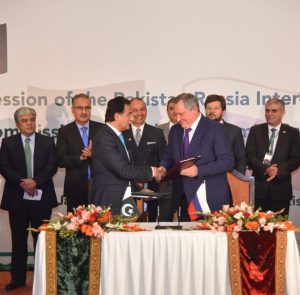Pakistan is close to a final agreement with Russia for the import of crude oil and petroleum products, with the first consignment expected to arrive in the country after a final deal is sorted in late March.
Russian Energy Minister Nikolay Shulginov was in Pakistan last week to discuss the deal. “We have already decided to draft an agreement to sort out all the issues that we have with regard to transportation, insurance, payments and volumes. These issues are in the final stage of the agreement,” Shulginov said.
Granted that the crucial details still need to be ironed out, the deal, if finalized, would be significant for Pakistan’s economy and its ties with the world.
It is the first solid start that Pakistan and Russia have made toward establishing bilateral cooperation in the oil and gas trade. In the past, conversations in this regard did not move beyond statements of interest.
Now, Pakistan not only wants to start imports in a few months but also desires to fulfill 35 percent of its total crude oil requirement from Russia. If all goes as planned, the trade could reshape the bilateral relationship to a greater extent, allowing both countries to structure their ties more effectively.
The prospect of oil and gas imports from Russia also means that Pakistan, which is already procuring oil from Saudi Arabia and other Gulf states on deferred payment options, has another source to access oil at discounted prices.
This is important as Pakistan faces a default-like situation, with foreign currency reserves barely enough to cover three weeks of oil imports. Energy accounts for the biggest share of Pakistan’s imports, and cheaper oil from Russia will help Pakistan in containing the expanding trade deficit and balance-of-payments crisis.
At this stage, it is unclear which currency Pakistan and Russia will use to make the payment. However, Pakistan is expected to use the Chinese yuan to pay for Russian oil. According to the joint statement, once “consensus on the technical specification [is] achieved, the oil and gas trade transactions will be structured in a way it has mutual benefit for both countries.” This could help ease some of the pressure Pakistan is facing on its foreign currency reserves.
The development is also a major diplomatic success for Pakistan. It seems that Pakistan has found a way to get around Western sanctions against Russia in the wake of the Russian invasion of Ukraine. Had Pakistan feared that the deal would provoke the United States and its allies, the country may not have reached this advanced stage of negotiations with Russia. This is particularly important as Pakistan is currently negotiating another review for the release of crucial funds from the International Monetary Fund (IMF).
The fast pace with which Pakistan and Russia are moving to close a deal indicates that the United States may not have an objection to the two countries doing business. It is also possible that Pakistan may have taken the U.S. on board regarding its decision to import Russian oil. So far, neither the U.S. nor Pakistan’s traditional energy suppliers in the Gulf have issued statements objecting to Islamabad’s ongoing negotiations with Moscow.
The United States seems to be willing to ignore the deal. Earlier this week, emphasizing the U.S. role in stabilizing Pakistan’s economy, State Department spokesman Ned Price said: “This is a challenge that we are attuned to. I know that Pakistan has been working with the IMF and other international financial institutions. We want to see Pakistan in an economically sustainable position.”
Washington is reported to have deepened engagement with the current Pakistani government on financial matters. A delegation of senior U.S. Department of Treasury officials is expected to visit Pakistan soon to discuss different aspects of financial assistance for Pakistan. Additionally, the U.S. embassy in Islamabad is planning to organize a conference in March in Pakistan to discuss energy security issues.
Seemingly, things are working out for Pakistan. Its attempt to lock in a deal with Moscow is moving forward without much resistance from anywhere. Islamabad should now be focused on completing all technical details to ensure that Russian supplies arrive at Pakistan’s ports at the earliest.

































